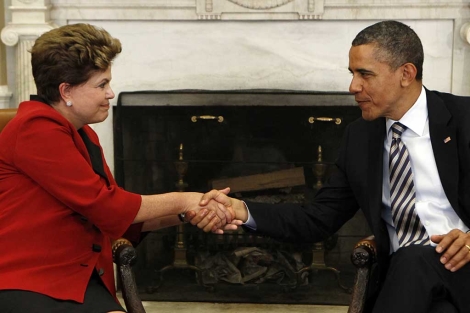
The president of Brazil, Dilma Rousseff, expressed this Monday to her U.S. counterpart, Barack Obama, her worry about the expansive monetary policies of the rich countries considering that they damage the growth of emerging nations.
After the bilateral meeting was held in the White House, Rousseff said that she transmitted her worry about this expansive policy of the U.S. and the European Union (EU) to Obama by asserting that, “it ultimately leads to the depreciation of the coin value of the countries in development, which hurts their growth.”
Nevertheless, she praised the role played by the central banks and the Central European Bank in particular “for preventing a liquidity crisis of considerable proportions that would have negatively affected all countries.”
The Brazilian government has accused the U.S. and China of promoting a currency war to increase exports, which is reducing competition for developing countries like Brazil.
In her first official visit to the U.S. as president and after Obama had visited Brazil in March of 2011, Rousseff wanted to emphasize that the relationship between the two countries “has never been stronger,” and advocated to reinforce it even more.
“We have made enormous progress since our last encounter in the bilateral relation,” Obama emphasized, who praised the leadership of Rousseff as much as her predecessor, Luis Inacio Lula de Silva, for “taking millions (of people) out of poverty” in Brazil and converting her country into a leading voice in the region and the world.
Obama sustained that trade and investment between the U.S. and Brazil “is happening at record levels,” and highlighted the agreements reached between the two countries to increase defense cooperation.
He also commented that he talked with Rousseff about the Summit of the Americas of April 14 and 15 in Cartagena, Colombia, which both will attend to assure that they are in close cooperation on issues like clean energy, drug trafficking, and citizen security.
Obama and Rousseff did not reveal if they had tackled the topic of Cuba and its participation in future Summits of the Americas.
According to Brazilian officials, Rousseff wanted to demonstrate her conviction to Obama today, shared with the majority of Latin American countries, of which the Cartagena should be “the last” continental summit “without Cuba.”
Obama will have to fight in Cartagena in the debate about Cuba’s presence in the next Summits of the Americas, after not arriving at a consensus to invite that country.
The only government that has openly expressed its disapproval of inviting Cuba to Cartagena is the United States, which considers that Caribbean country as not complying with the democratic requisite that the participants of the Summits of the Americas established in 2001.

Leave a Reply
You must be logged in to post a comment.